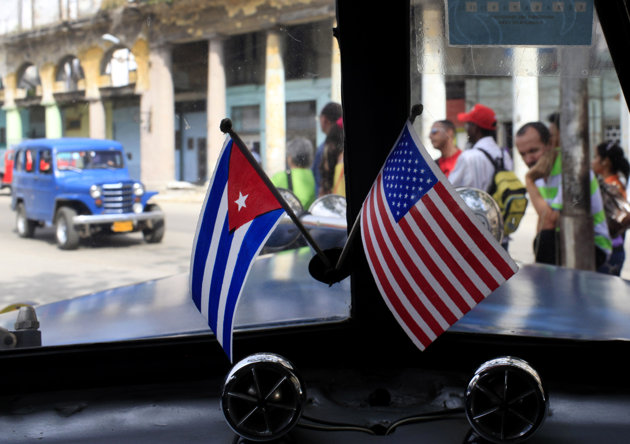

There. I’ve said it in print and in public.
I was in Cuba last week. My fifth completely legal visit in the last few years. It’s changing fast and I love it still. I didn’t post a blog last Friday (hope you missed it!) because of severely restricted internet access. I had not had a problem in the past, but this time when I tried to get into my gmail account, I got the following message:
“Google restricts access to some of its enterprise services in certain countries, such as Cuba, Iran, North Korea, Sudan, and Syria.”
Yikes! My assumption was that the Cubans were restricting access. Upon returning home, I did some research into the subject. Like most things, it’s complicated, but my conclusion is this:
1. The Cuban government restricts access to some internet sites.
2. The U.S. government restricts internet companies who service website and email accounts.
How interesting. The U.S. relentlessly and ruthlessly derides the government of Cuba for abusing its power. So who exactly is calling the kettle black?

Eleven U.S. Presidents have enforced the embargo. More than fifty years of futility.
The embargo has prevailed through the administrations of Eisenhower, Kennedy, Johnson, Nixon, Ford, Carter, Reagan, Bush, Clinton, Bush and Obama. For more than 53 years, we have failed to dislodge the Castros. Meanwhile, the Castros are making significant democratic reforms. Rather than acknowledge any of this, we cling to our bullying ways and insist that we’re right and they’re wrong.
As one who believes that travel is the best way to facilitate peace and understanding, the subject fascinates me and I’ve collected much data. Most of my information comes from the Center for Democracy in the Americas which is devoted to changing U.S. policy toward Cuba and the other countries of the Americas. They propose that we build relationships on mutual respect, foster a dialogue and recognize positive trends in democracy and governance. Sounds good to me!
 United Nations Resolution: The U.N. General Assembly has voted against U.S. policy regarding Cuba for twenty-one straight years!
United Nations Resolution: The U.N. General Assembly has voted against U.S. policy regarding Cuba for twenty-one straight years!
The most recent vote on Nov 13, 2012 went as follows:
– 188 votes to END the embargo
– 3 votes to KEEP the embargo (U.S., Israel and Palau)
– 2 abstentions (The Marshall Islands and Micronesia).
The sanctions are among the most restrictive our government imposes on against any nation.
Quote of the year: Newly-elected Senator Jeff Flake (AZ), who had a strong anti-embargo record as a U.S. Representative, encouraged John Kerry to use his presumptive position as Secretary of State to continue to loosen travel restrictions and allow further engagement between Cubans and Americans. He stated, “With regard to Cuba…the best way to foster change and progress toward democracy is to allow travel, free travel of Americans, to let them go as they wish. I don’t think that that’s a weakness or any capitulation at all.” Sen. Flake ruffled the feathers of some of his Cold Warrior colleagues when he joked, “I’ve often felt that if we want a real get-tough policy with the Castro brothers, we should force them to deal with spring break once or twice.”

Entrepreneurs in their restaurant in Havana
Entrepreneurship: Since late 2010 when the government began issuing new licenses for Cubans to work for themselves and employ one another, more than a quarter of a million entrepreneurs and their employees have joined the private sector.
Succession: After Fidel stepped aside in 2006, Raul Castro replaced almost every member of the Cabinet. There are only a few government officials remaining from the original revolutionaries from 1959, called the “historicos.” Raul has made it clear that future leaders will come from the ranks of people who are problem solvers, many of them are women, or people of African descent.
Political Prisoners: I don’t have the statistics, but Cuba has released a LOT of political prisoners. In addition, Colombia turned to Cuba to help it broker peace talks with the FARC. (Meanwhile, there’s Guantanamo Prison …)
Censorship: ETECSA, Cuba’s telecommunications monopoly, has blocked a dissident hotline called “Háblalo Sin Miedo” (Say it Without Fear) that allowed participants in Cuba to quickly send reports to counterparts in the U.S. and Spain by leaving messages of up to three minutes in length.
Corruption: Transparency International, an organization that fights corruption, has published its Corruption Perception Index for 2012. The report compares the perceived level of corruption in 176 countries and territories. Some relevant rankings:
#1. (three-way tie) New Zealand, Denmark & Finland
#9. (two-way tie) Canada & Netherlands
#17. (two-way tie) United Kingdom & Japan
#19. United States
#22. France #25. Ireland #30. Spain #41. Israel
#58. Cuba
#72. Italy #94. Greece #118. Ecuador
#133. Iran
#173. Sudan
#174. (last on the list) North Korea
 The embargo is not hurting the government of Cuba. It hurts the people of Cuba. And it restricts Americans from freely traveling to a beautiful, safe and intriguing country.
The embargo is not hurting the government of Cuba. It hurts the people of Cuba. And it restricts Americans from freely traveling to a beautiful, safe and intriguing country.
Copyright 2024 WOW! Travel. All Rights Reserved.
5 Comments
Corrine Draper July 3, 2013 at 9:46am
Thank you for writing and publishing this article, Marilyn. Obviously, you have put a lot of research, thought, experience, and heart into it. Hopefully, it will force us to look more closely at why we do keep so many outdated rules and regulations when they are no longer relevant. It would be nice to see this administration begin to do something to change our relationship with Cuba. Who knows, maybe they will see your article and “see the light.” One can hope.
Thank you again, and happy travels.
Corrine
Marilyn July 3, 2013 at 10:10am
There’s always hope!
Jim Lockard July 3, 2013 at 11:37am
Thanks for posting this, Marilyn. I have felt this way for some time – after living in South Florida and seeing younger generations of Cuban-Americans open to a better relationship with Cuba.
Dorianne and I are interested in talking to you about taking a group there in 2014.
Warren Conklin July 4, 2013 at 10:22am
The fact that Transparency International doesn’t include any of the southern Africa countries (Zimbabwe, Nigeria, South Africa, etc.) high on the list of perceived corrupt countries speaks volumes about their objectivity.